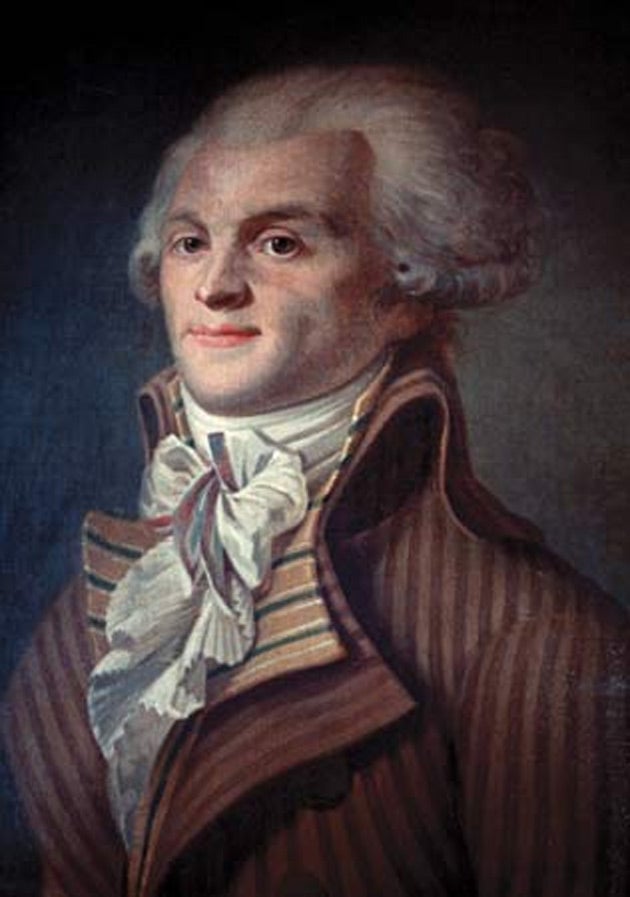The Weekend's Television: Terror! Robespierre and the French Revolution, Sat, BBC2<br>Revelations: Commando Chaplains, Sun, Channel 4
Perfectly executed

Start getting nervous when the euphemisms arrive, but run like hell when they get to the oxymorons.
It wasn't a good sign when Robespierre and his colleagues formed the Committee of Public Safety in 1793, with revolutionary France besieged on all sides by imperial arms bent on the punishment of regicide. A shrewd student of history (and not just French revolutionary history) might have wondered whether the safety of the public was really going to be advanced by this organisation. But by the time Robespierre was saying "Forgiveness is barbarity, tolerance is atrocity" even the dimmest sans-culotte should have noticed that something was up. When they tell you that black is white – and that suggesting otherwise is treason – you know you're in trouble.
Terror! Robespierre and the French Revolution pretty much confined itself to the journey between those two points, from the establishment of the Committee of Public Safety to the moment when Robespierre himself, jaw shattered by a musket ball, was slid into the lethal cure-all of the guillotine. It took you from the limitless euphoria of revolution ("Bliss was it in that dawn to be alive") to the nauseating paranoia that followed, as Robespierre and his colleagues came to believe that the new state would have to be baptised in blood. And, just to drive home the fact that the embers of this conflagration are not yet cold, Mark Hayhurst, who wrote and produced the programme, had arranged to incorporate a violent combat into the programme itself, between the historian Simon Schama (speaking for Enlightenment humanitarianism) and the Marxist psychoanalyst Slavoj Zizek (speaking for philosophical provocation).
He enjoys goading people, does Slavoj, rubbing his nose excitedly as he delivers another affront to liberal consensus in his mangled Slavic accent ("Virtue without terror ish impotent... terror without virtue ish blind, no?"). And, fortunately for the programme, Simon Schama was pretty goadable. Indeed, there were moments here when you felt it was a good thing the two men had been interviewed on separate occasions. Slavoj would insist on the necessity – the beauty even – of Robespierre's cruelty and then you would cut to Schama, seething with fury, as angry as if the tumbrils were still rolling across the channel. Occasionally, other people got a look in too; most effectively the novelist Hilary Mantel, who wrote a fine novel about Robespierre, and who here observed the almost dreamlike acceleration of the terror with a dispassionate, wondering eye.
There were actors too – not always a happy addition to a history programme that already has a cast of passionate and well-informed contributors, but pretty successful here because of the claustrophobia of the setting, a single room in which the committee argues about what direction the revolution should take. As always in these things I hankered after an on-screen symbol – to announce the moment at which you'd passed from authentic speech to the restorer's gouache that fills in the gaps. Did Collot d'Herbois, ultimately one of the most brutal members of the committee, really say "Food must be hunted out of the barns with bayonets... that is the most efficient form of agriculture we have", or was Hayhurst putting words into his mouth? And when Robespierre defends the universal paranoia that the Terror has ushered in with the words "Suspicion is a superb thing... it is to liberty what jealousy is to love", was this a genuine aphorism or a pastiche one?
To my mind, Schama easily had the best of it in the head to head with Zizek, hindsight favouring his moral indignation at the casualness with which quite ordinary men transformed themselves into mass murderers. I'm not sure that Slavoj did his cause much good with a muddled metaphor, which appeared to compare a bloodless revolution with decaffeinated coffee, as if indiscriminate brutality was what you need to give social change a bit of zip. And when he robustly defended Robespierre's argument that fear of denunciation was tantamount to an admission of guilt it dawned on you that his arguments would have been just as valid if applied to Saddam Hussein, rather than a provincial lawyer with a commitment to egalitarian utopia. Schama, meanwhile, revealed that even the most liberal mind can contain a little bloodlust: "I would love to have been there," he said of the moment when the Convention turned on Robespierre and the Incorruptible's fate was sealed.
Revelations – Channel 4's intriguing series of religious documentaries – accompanied two Royal Marine chaplains on duty in Afghanistan. Judging from the footage here, a chaplain in a war-zone is a bit like a vicar in a pub. You want them there at moments of crisis, but having them hang around being matey when you're trying to relax between fire-fights puts a distinct dampener on things. The programme was oddly light on the theological contradictions of being a Christian in uniform, but for a passing moment when one of the chaplains seemed to acknowledge that an army of true believers wouldn't be very good at winning wars.
Join our commenting forum
Join thought-provoking conversations, follow other Independent readers and see their replies
Comments
Bookmark popover
Removed from bookmarks